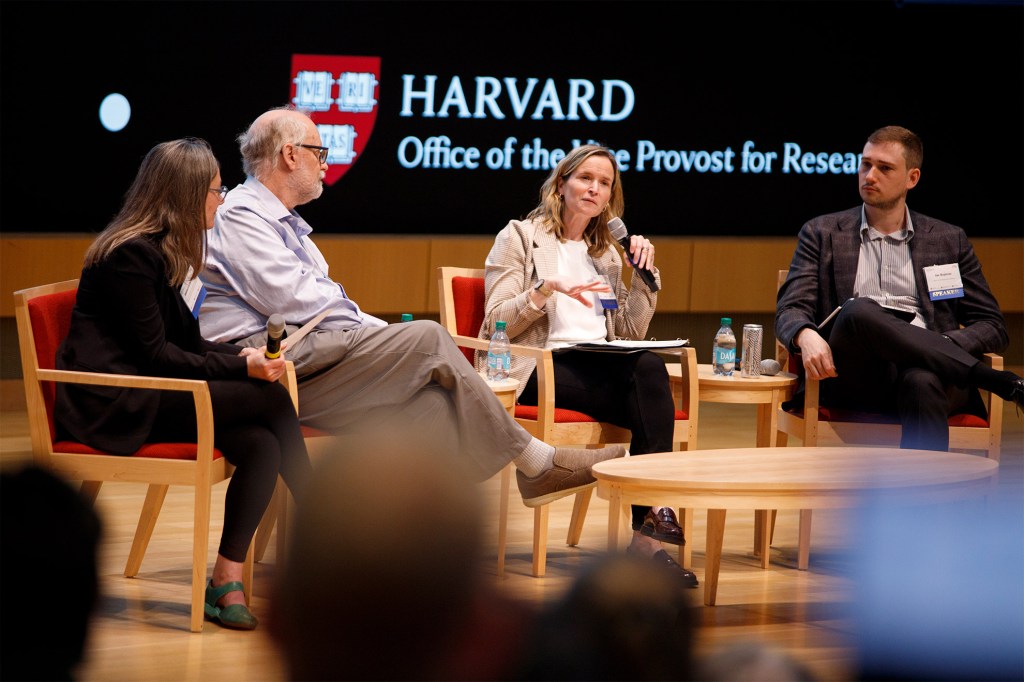How is generative AI shaping academia? Faculty, students, and staff from across Harvard gathered recently to tackle that urgent question.
Speakers at the half-day event, co-sponsored by the Digital Data Design Institute at Harvard, the Office of the Vice Provost for Research, and the Office of the Vice Provost for Advances in Learning, wrestled with how generative AI is changing the skills students need to succeed. The core message: AI compels higher education to fundamentally re-evaluate its purpose, its methods, and its values.
“This is an incredible opportunity for all of us, wherever we are at Harvard, to imagine how the ways in which we work, the ways in which we teach, the ways in which we learn, and the ways in which we do our research can be fundamentally transformed,” said Karim Lakhani, Dorothy and Michael Hintze Professor of Business Administration and founding chair of the Digital Data Design Institute. “Our mission of veritas can actually be enhanced by using these tools.”
“We need to be clear that access to information is not the same as learning, and it’s certainly not the same as active learning and sustained learning.”
Nonie K. Lesaux, dean of the faculty

Harvard University Provost and Dane Professor of Law John Manning framed the event at Klarman Hall as a “One Harvard” moment.
The symposium surfaced disagreements about the proper use of AI in academia. Rebecca Nesson, panel moderator and dean for academic programs at the John A. Paulson School of Engineering and Applied Sciences, polled the audience: Is it OK for students to use AI to summarize the readings for a class, instead of doing the reading themselves? Is it appropriate for a professor to use AI to write a letter of recommendation? What about a first-pass assessment of student work? The audience was split.
In a panel on generative AI and the future of learning, the speakers grappled with what it means to genuinely learn something in a world shaped by AI.
“We need to be clear that access to information is not the same as learning, and it’s certainly not the same as active learning and sustained learning,” said Nonie K. Lesaux, dean of the faculty and Roy E. Larsen Professor of Education and Human Development at Harvard Graduate School of Education.
Christopher W. Stubbs, Samuel C. Moncher Professor of Physics and of Astronomy at FAS and senior adviser on generative AI, said FAS faculty vary in their adoption of AI and AI policies in the classroom: Some organize their teaching around it, while others ban it outright. “We have a long way to go in having our colleagues appreciate what this means, to rip down to the studs what it is we want to accomplish in the education we give our students, and then build it back up again,” he said.
Iavor Bojinov, assistant professor and Richard Hodgson Fellow at Harvard Business School, teaches the first AI-native course at that School, “Data Science and AI for Leaders.” Students use AI to prepare for class, answer questions, and build their own companies. “People are very positive about these tools, but it made it so easy for them to cheat. A lot of students came to me and said, ‘I can just copy-paste things, so do I really need to learn these things?’ This is something we’re thinking really hard about.”
Despite these open questions, researchers across Harvard are leveraging generative AI to achieve remarkable advancements. Alberto Cavallo, Thomas S. Murphy Professor of Business Administration and co-director of the Pricing Lab at the Digital Data Design Institute, used it to identify the countries of origin for thousands of products to estimate the impact of tariffs. Rachel Carmody, Thomas D. Cabot Associate Professor of Human Evolutionary Biology at FAS, shared AI research that combed through 40 terabytes of metagenomic data to analyze the possible extinction of certain gut bacteria in developed countries. “It’s a trillion-piece jigsaw puzzle,” she said. “With generative AI, we can get results back in a week, whereas a year ago it would have taken us a year.”
The symposium is the latest in Harvard’s efforts to elevate teaching, learning, and research through the innovative use of AI. Harvard Business School launched the Digital Data Design Institute in 2022 to be a global research center, providing data-driven insights on the ways AI is transforming work and the economy. In 2023, Harvard University Information Technology, in partnership with the Vice Provost for Advances in Learning, the Faculty of Arts and Sciences, and faculty and staff from across the University, launched an AI “sandbox” where users can safely play with various large language models.
The symposium finished with student presentations and a reception featuring hands-on demonstrations of AI applications. FAS, the SEAS, HUIT, and the Harvard Library also co-sponsored the event.
Source link

